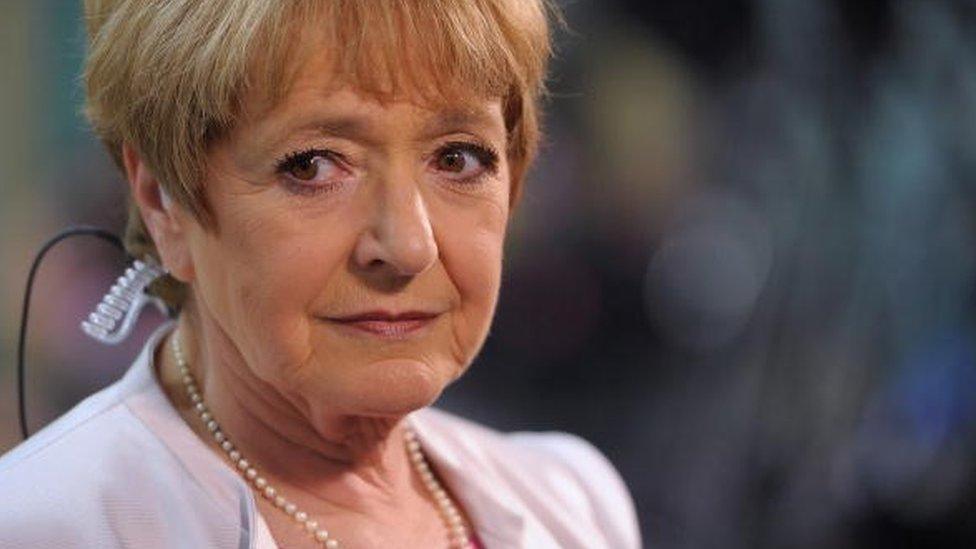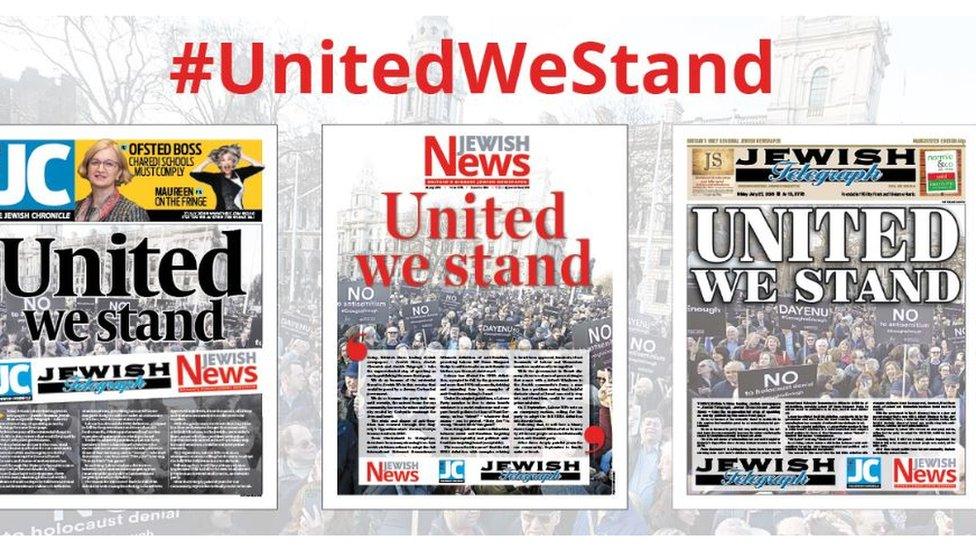Ian Austin: Labour MP faces action after anti-Semitism code row
- Published
"I'm upset... about the leadership's failure, I think refusal really, to deal with this properly"
A Labour MP who is being investigated over his behaviour during a row about the party's anti-Semitism code has denied "screaming" abuse.
Ian Austin is facing possible suspension after the argument with the party's chairman Ian Lavery.
The MP for Dudley North, who is the adopted child of a Jewish refugee, said it was a "heated discussion" about how the party tackles anti-Semitism.
He told BBC Radio 4 he called the anti-Semitism code of conduct a "disgrace".
But he added: "Did I scream abuse at anybody? No I didn't."
A Labour spokesperson, responding to the incident, said the party takes all complaints extremely seriously, adding: "These are fully investigated in line with party rules and procedures".
Labour's code of conduct was drawn up earlier this month and followed allegations of anti-Semitism within party ranks.
The code does reproduce the International Holocaust Remembrance Alliance's "working definition", external of anti-Semitism and lists behaviours likely to be regarded as anti-Semitic.
But Jewish leaders and some Labour MPs have been critical, pointing out the code does not include four working examples provided by the IHRA definition. They say the party should adopt these examples in complete form from the IHRA.
Labour says its own wording "expands on and contextualises" the IHRA examples.
The party has said that while the examples are not reproduced word for word, they are covered elsewhere in the new code and it has produced "robust, legally sound guidelines that a political party can apply to disciplinary cases".
The IHRA examples of anti-Semitic behaviour include requiring higher standards of behaviour from Israel than other nations and comparing contemporary Israeli policies to those of the Nazis.
According to the Observer,, external Mr Austin received a letter warning him he could face disciplinary action following the incident.
Speaking to the Radio 4 programme The World This Weekend, Mr Austin denied he was using the ongoing anti-Semitism debate as a way to attack Jeremy Corbyn.
Mr Corbyn has repeatedly said anti-Semitism is wrong and it will not be tolerated in the party.
Anti-Semitism is simply wrong - Corbyn
Mr Austin said the Labour leader had always been on the "extreme fringes" of the party, "supporting and defending all sorts of extremists and in some cases frankly, anti-Semites".
"That's why I think now that somebody with views and history like his isn't really suited to the leadership of a mainstream political party," he said.
"Am I upset about anti-Semitism? Yes I am. And I'm upset as well about the leadership's failure, I think refusal really, to deal with this properly.
"I grew up listening to my dad tell me how he'd escaped from the Holocaust and how his mum and sisters were murdered in Treblinka [a Nazi death camp] and that led to me joining Labour Party as a teenager determined to fight racism."
"I'm really shocked that a party that has got a proud tradition throughout its entire existence of fighting racism has ended up causing such huge offence and distress to the Jewish community in Britain."
Mr Austin said he was "ashamed of the Labour Party", adding: "We are becoming a different political party. This could just never have happened in the past."
Mr Austin is the second Labour MP to face suspension, after the party launched a disciplinary inquiry into Labour veteran Margaret Hodge.
She reportedly swore at Jeremy Corbyn and called him an anti-Semite.
Margaret Hodge says she is "incredibly upset" at Labour's anti-Semitism row
Labour's shadow justice secretary Richard Burgon said he would not condemn Mr Austin as he "didn't see what happened", adding that he hoped the situation could be resolved "amicably".
"What we need to ensure is that the people who disciplinary action is taken against are the small number in the party who have said or done anti-Semitic things, not those who have strong opinions about things we should all have strong opinions about."
Labour's National Executive Committee approved its new code following continuing criticism of its handling of anti-Jewish discrimination and attitudes within its ranks.
After criticism of its code of conduct, the party said it would "in recognition of the serious concerns expressed... reopen the development of the code" in consultation with Jewish groups.
The party's MPs will vote in September on whether to adopt the full IHRA wording after passing an emergency motion at a meeting on Monday night.
Earlier this week, the UK's three main Jewish newspapers united to publish the same front page, warning that a Corbyn-led government would pose an "existential threat to Jewish life".
Two senior members of Mr Corbyn's shadow cabinet have also suggested the controversial new code of conduct should be rewritten.
Shadow health secretary Jonathan Ashworth urged the party's ruling NEC to "reconsider" its decision and include the full definition.
Barry Gardiner, shadow international trade secretary, said it "would have been better" to adopt the IHRA definition in full.
Labour MPs Chuka Umunna, Liz Kendall and Anna Turley have also been critical.
And five senior Scottish Labour politicians - MSPs Monica Lennon, Jackie Baillie, Anas Sarwar, Daniel Johnson and Colin Smyth - on Sunday said they want the wider party to adopt the wording in full.
The Board of Deputies of British Jews said Labour has become a party that "obstructs measures to counter hatred and punishes those who speak out against it" and called on Mr Corbyn to lead it out of "this deep abyss".
- Published26 March 2018

- Published18 July 2018

- Published25 July 2018
